Read the latest edition of the BU policy influence digest newsletter. It is drawn from several sources including directly from UK central and devolved administrations, newsletters from Parliament Knowledge Exchange Unit, UPEN and others.
Items this week include;
- New consultations and inquiries for policy impact – 08/10/2024
- New opportunities to respond to consultations and inquiries from the UK and globally
- Behind the scenes of the government’s areas for research interest
- Who’s using the government’s new ARI database, and how are different government departments engaging with the researchers who get in touch?
- Ten things we heard at the Labour Party Conference – HEPI
- At the Labour Party Conference, higher education was highlighted as essential for addressing economic growth, skills development, and widening participation, with a strong focus on funding, partnerships, and embracing AI in education.
- Research Professional – Five things we learned from the Labour conference
- And the big question that universities are still waiting to have answered
- How evidence-informed policymaking works in a Union of 27 states
- This event will shed light on the work of The Scientific Advice Mechanism (SAM) and how the European policymaking process works.
- A Policymaker’s Perspective: The Value of Arts and Humanities Research in the Policy Landscape
- From UPEN – In this blog, Dr Domonique Davies, University of Reading reflects on the value of arts and humanities research on policy and shares insights from policy makers actively looking for researchers to engage with them.
















 Second NIHR MIHERC meeting in Bournemouth this week
Second NIHR MIHERC meeting in Bournemouth this week Dr. Ashraf cited on ‘Modest Fashion’ in The Guardian
Dr. Ashraf cited on ‘Modest Fashion’ in The Guardian NIHR-funded research launches website
NIHR-funded research launches website MSCA Postdoctoral Fellowships 2025 Call
MSCA Postdoctoral Fellowships 2025 Call ERC Advanced Grant 2025 Webinar
ERC Advanced Grant 2025 Webinar Horizon Europe Work Programme 2025 Published
Horizon Europe Work Programme 2025 Published Horizon Europe 2025 Work Programme pre-Published
Horizon Europe 2025 Work Programme pre-Published Update on UKRO services
Update on UKRO services European research project exploring use of ‘virtual twins’ to better manage metabolic associated fatty liver disease
European research project exploring use of ‘virtual twins’ to better manage metabolic associated fatty liver disease